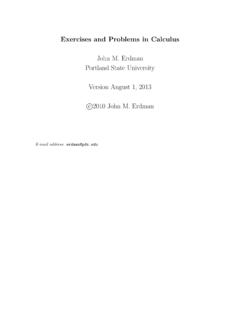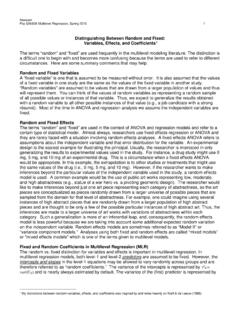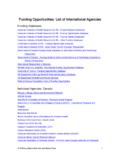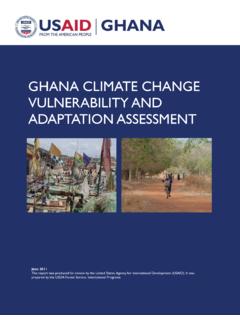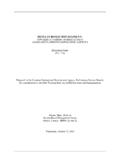Transcription of Canadian International Development Agency (CIDA) support ...
1 CENTRE FOR THE STUDY OF DEMOCRACY Policy Studies Building, Room 335 138 Union Street Queen s University Kingston, Ontario, Canada K7L 3N6 Tel: 613 533-6273 Fax: 613 533-2135 CREATING DEMOCRATIC VALUE: EVALUATING EFFORTS TO PROMOTE DEMOCRACY ABROAD Canadian International Development Agency (CIDA) support for civil society in China BRUCE GILLEY, RANA SIU-INBODEN, AND STEPHEN NOAKES Global Peace and Security Fund Foreign Affairs and International Trade Canada (DFAIT) GBP March 21, 2008 2 TABLE OF CONTENTS PART 1: BACKGROUND AND CONTEXT 3 DEMOCRATIC POSITION AND CONTEXT 3 DEMOCRACY ASSISTANCE EFFORTS IN CHINA 4 civil society IN CHINA 4 civil society ASSISTANCE EFFORTS IN CHINA 6 PART 2. DEMOCRACY INTERVENTION 8 PROJECT DESCRIPTION AND OBJECTIVES 8 EXISTING EVALUATIONS 11 PART 3: EVALUATION KNOWLEDGE 12 CASE #1: MOBILIZING VILLAGERS FOR FOREST PROTECTION IN YUNNAN 13 CASE #2: MOBILIZING RESIDENTS FOR COMMUNITY PARTICIPATION IN SHANGHAI 16 CASE #3: MOBILIZING MIGRANT WORKERS FOR SELF-PROTECTION IN BEIJING AND BEYOND 17 OVERALL CSP PROGRAMME EVALUATION: MICRO-LEVEL 19 PROGRAMME EVALUATION: MACRO-LEVEL 20 PROGRAMME EVALUATION: MESO-LEVEL 21 PART 4.
2 RECOMMENDATIONS 22 GENERAL LESSONS FOR DEMOCRACY ASSISTANCE TO civil society 22 SPECIFIC LESSONS FOR THE CIDA civil society PROGRAM IN CHINA 22 CONCLUSION 23 3 Canadian International Development Agency (CIDA) support for civil society in China Bruce Gilley, Rana Siu-Inboden, and Stephen Noakes Part 1: Background and Context Democratic Position and Context China is a closed authoritarian regime ruled by a single party whose position is guaranteed by the country s constitution. It accounts for 55% of the world s population that is classified by Freedom House as living under Not Free governments. Since post-totalitarian reforms were launched in 1978, however, the Chinese state has liberalized to a limited degree. In particular, greater economic and social freedoms have been permitted for individuals, while the state has been partly constrained by an emergent legal system and by the provision of some mechanisms of horizontal accountability courts, legislatures, and auditors general for example.
3 In terms of the Perlin model, China in the reform era has achieved democratic progress in only a few areas constitutionalism, legally recognized rights, the rule of law, government effectiveness, and a market economy. In other areas democratic values and culture, democratic control of the security apparatus, accountability, elections, party Development , and information flows, social equality, and social cohesion -- progress has been minimal. Freedom House rates China as a on its 7-to-1 scale, while Polity IV gives it a score of minus 7 on its minus-10 to plus-10 scale. Despite periodic popular protests in favour of faster political liberalization, most notably in the Tiananmen Square demonstrations of 1989, the process of democratization has remained a largely state-led one. Prominent pro-democracy activists in China are regularly arrested and jailed.
4 The most active popular movement for democracy in China exists outside of the country s borders. The main democratic advances of the reform era in particular the promotion of direct elections for village governments beginning in 1987 have been driven by the state in order to improve governance. China is also unique in being largely insulated from International pressures and demonstration effects. Indeed, the Beijing Consensus that combines authoritarian rule with state-controlled marketization has become a model of emulation by other developing countries. Despite the absence of significant democratic breakthroughs in China in the post-1978 reform era, the country s political trajectory is still best understood in terms of the democratic transitions paradigm . The question of democracy appears repeatedly in both elite and popular politics, and a lively scholarly debate on the conditions that might make democracy possible is now permitted in the country.
5 China remains a poor country its income per capita according to recently-adjusted World Bank estimates was only US$4,091 in 2005 using price-equivalent (purchasing power parity, or PPP) exchange rates, roughly the same as income levels in Azerbaijan or Angola. Given such conditions, it is no surprise that China remains an authoritarian regime and that democratization remains embryonic. China also faces the challenge of its enormous size, both geographical and demographic. The current population of billion is expected to peak at around 1. 6 billion by 4mid-century, which increases the need to create an effective state and to forge the bonds of community that ensure a democratic success. China, however, enjoys a positive regional environment for democratization. In Asia Pacific as a whole, 29 of 39 states are electoral democracies, while 13 are liberal democracies, according to Freedom House.
6 Neighbouring states such as South Korea, Taiwan, Mongolia, Thailand, the Philippines, and Indonesia became democracies during the Third Wave of the mid-1970s to the early 2000s, while India and Japan have remained constitutional democracies since World War II. China also has an historical momentum for the creation of democracy that began with the May Fourth movement of 1919. Democratic discourse is deeply enmeshed in the modernization project of contemporary China, another reason it is appropriate to think of the country in terms of the transitions paradigm. Democracy Assistance Efforts in China Many official International donors are active in aid programmes in China that serve the goal of democratization. However, with only a few exceptions, most donors do not conceive of their activities in terms of democratization.
7 Human rights, social and economic Development , gender equality, environmental protection, and governance are more typical program goals. One exception is the activities of the government; the National Endowment for Democracy (NED), for instance, seeks to foster public debate of policy alternatives and proposals for constitutional and political reform. 1 From 1999 to 2006, government agencies including NED and State provided $110 million in democracy-related assistance to United Nations agencies such as the United Nations Development Programme, the UN High Commissioner for Human Rights, and the International Labour Organization have bilateral programmes with the Peoples Republic of China (PRC) government aimed at strengthening human rights. United Nations agencies with a specific democracy promotion focus, such as the United Nations Democracy Fund, however, are notably absent from China.
8 Nonetheless, since most donors work in areas that affect democratization, any evaluation of the effectiveness of a particular democracy assistance programme must take into account the impact of such programmes. As with most democracy assistance efforts, however, democracy assistance towards China is generally not complemented by a whole-of-government approach that also utilizes diplomacy, political advocacy, sanctions, and moral support for democratic actors. All donors separate their democracy assistance programmes in China from their broader bilateral relations, often resulting in policies that work at cross-purposes. civil society in China Concomitant with its economic and social liberalization since 1978, China has experienced the growth of civil society organizations that seek to represent the interests of various constituencies and interests and to draw attention to areas of failure of state performance.
9 At the end of 2006, there were 354,000 officially recognized civil society groups. However, the actual number is far higher. 1 National Endowment for Democracy, Asia Program Highlights, Available at Accessed 3 March 2008. 2 Thomas Lum, Assistance Programs in China , Congressional Research Service, 18 May 2007. Available at 5 The All-China Environmental Federation, a government body, said in 2005 that only a quarter of environmental organizations were formally registered. One EC report estimated that there were between million and 2 million unregistered civil society groups in Nonetheless, civil society in China is described by most practitioners as nascent and characterized by weak organizational Development , a heavy reliance on foreign funding, a heavy reliance on individual personalities, a lack of understanding from the general public, government suspicion, and burdensome registration requirements.
10 The PRC government s attitudes towards and thus policies for civil society groups have over time become more accommodating, although overall progress remains minimal and advances are generally followed by sharp crackdowns. Under the Social Mass Organizations Registration Management Regulation (revised 2007) organizations seeking registration must have a supervising government body in addition to official registration with the Ministry of civil Affairs (MOCA). In addition, only one organization in one field is allowed to register at each administrative level. Although recently local Bureaus of civil Affairs have begun registering some of the smallest NGOs without a sponsor, the registration system generally remains rigid and burdensome. All NGOs must also file a report on any project that is done in cooperation with, or with funding from, a foreign organization.
